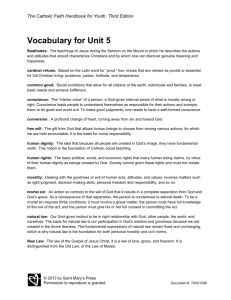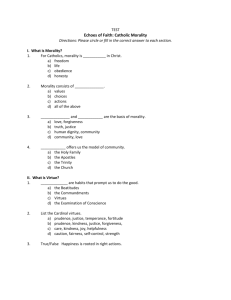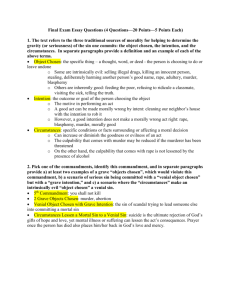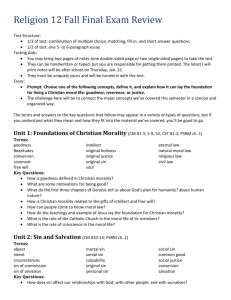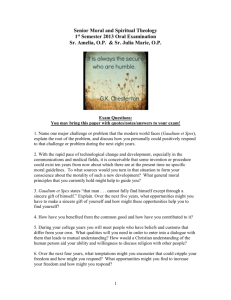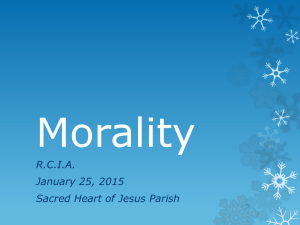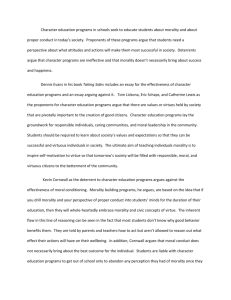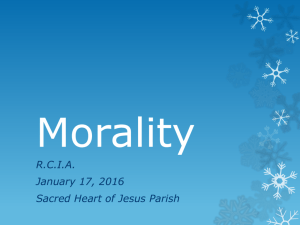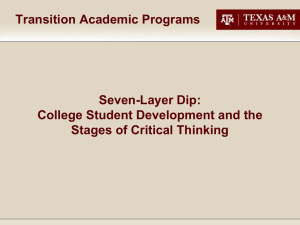Religion I: Growing in Christian Morality
advertisement
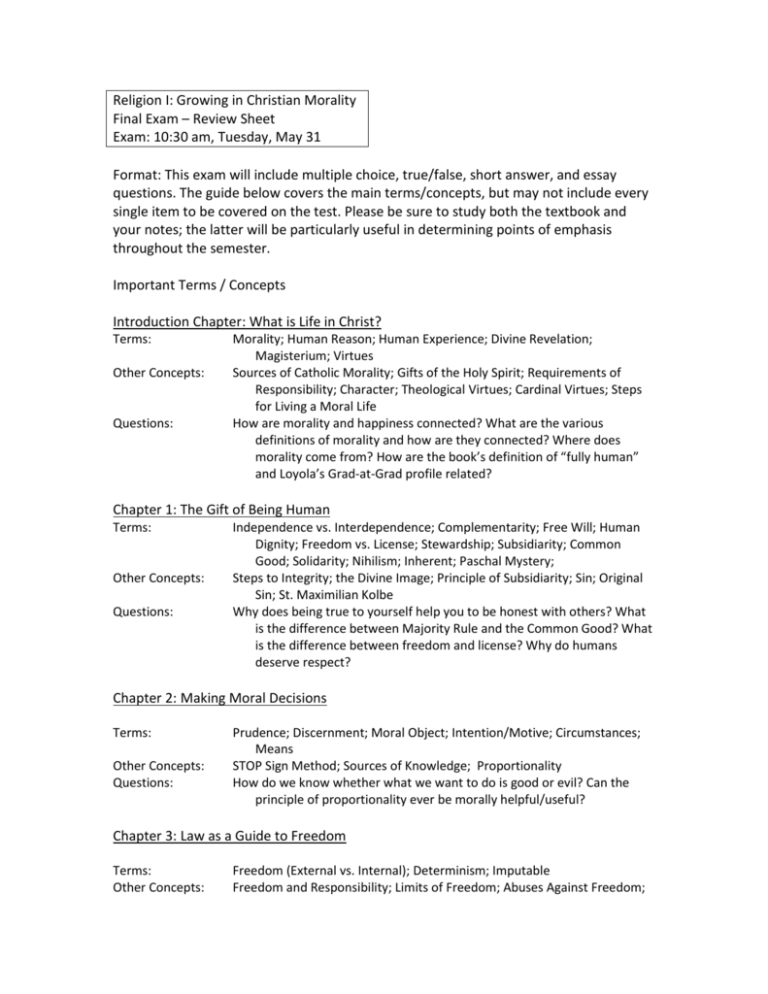
Religion I: Growing in Christian Morality Final Exam – Review Sheet Exam: 10:30 am, Tuesday, May 31 Format: This exam will include multiple choice, true/false, short answer, and essay questions. The guide below covers the main terms/concepts, but may not include every single item to be covered on the test. Please be sure to study both the textbook and your notes; the latter will be particularly useful in determining points of emphasis throughout the semester. Important Terms / Concepts Introduction Chapter: What is Life in Christ? Terms: Other Concepts: Questions: Morality; Human Reason; Human Experience; Divine Revelation; Magisterium; Virtues Sources of Catholic Morality; Gifts of the Holy Spirit; Requirements of Responsibility; Character; Theological Virtues; Cardinal Virtues; Steps for Living a Moral Life How are morality and happiness connected? What are the various definitions of morality and how are they connected? Where does morality come from? How are the book’s definition of “fully human” and Loyola’s Grad-at-Grad profile related? Chapter 1: The Gift of Being Human Terms: Other Concepts: Questions: Independence vs. Interdependence; Complementarity; Free Will; Human Dignity; Freedom vs. License; Stewardship; Subsidiarity; Common Good; Solidarity; Nihilism; Inherent; Paschal Mystery; Steps to Integrity; the Divine Image; Principle of Subsidiarity; Sin; Original Sin; St. Maximilian Kolbe Why does being true to yourself help you to be honest with others? What is the difference between Majority Rule and the Common Good? What is the difference between freedom and license? Why do humans deserve respect? Chapter 2: Making Moral Decisions Terms: Other Concepts: Questions: Prudence; Discernment; Moral Object; Intention/Motive; Circumstances; Means STOP Sign Method; Sources of Knowledge; Proportionality How do we know whether what we want to do is good or evil? Can the principle of proportionality ever be morally helpful/useful? Chapter 3: Law as a Guide to Freedom Terms: Other Concepts: Freedom (External vs. Internal); Determinism; Imputable Freedom and Responsibility; Limits of Freedom; Abuses Against Freedom; Questions: Canon Law; Impediments; Morality of Emotion; Guidelines: Creeds, Values, Principles, Norms; Aquinas’s Elements of Good Laws; Four Kinds of Law: Eternal, Natural, Revealed, Church/Civil; Precepts of the Church Why is Freedom important? Why are there so many laws, and why does the Church give us laws and guidelines? Chapter 4: Jesus as a Moral Guide Terms: Other Concepts: Questions: Beatitude; Kingdom of God; metanoia; justification; grace; charisms; discipleship; contemplative orders; apostolic orders Praying the Lord’s Prayer; Responding to Challenges; Old Law vs. New Law How does Jesus model for us the way to live a moral life? How is he the moral norm? How are we able to follow him in or own lives? Chapter 5: Conscience Formation Terms: Other Concepts: Questions: Conscience; fortitude; martyr; What Conscience is Not; SEER Method; Life of Oscar Romero How do we develop our conscience? Where does it come from? When are we expected to follow our conscience? Chapter 6: Sin and Forgiveness Terms: Other Concepts: Questions: Hattah (hamartia); Pesha; Awon; Personal Sin; Mortal Sin; Venial Sin; Reconciliation; Concupiscence; Social Sin; Repentance; Contrition; Absolution Seven Capital Sins; Penance; Unforgivable Sin (p. 158); How do we differentiate different sins from one another? Where does sin come from? What does it mean to be forgiven? Chapter 7: Love for God Terms: Other Concepts: Questions: Covenant; Voluntary Doubt; Incredulity; Heresy; Apostasy; Schism; Agape; Idolatry; Divination; Sacrilege; Simony; Humanism; Materialism; Blasphemy Faith, Hope, Charity; Communism, Humanism, Presumption; Atheism; Agnosticism What does it mean to make God the top priority in your life? Is growing in your faith something you can actually work toward? Chapter 8: Respect for Life Terms: Other Concepts: Self-esteem; Euthanasia; Abortion; Assisted Suicide; Temperance; Abstinence; Sobriety; Chastity Abortion Arguments; Teen Drinking; Peace; Just War Theory Questions: What does it mean to ‘kill’ someone? Why is life so precious? In what ways can we show respect for this gift from God? Chapter 9: Respect for the Gift of Sexuality Terms: Other Concepts: Questions: Fidelity; Fecundity; Infertility; Adultery; Divorce; Polygamy; Incest; Free Unions; Modesty; Masturbation; Fornication; Rape Gay Marriage; “Drawing the Line”; Chastity; Date Rape How do the media influence the ways we view sex? Who are the people with whom you can discuss issues related to sexuality? How is it possible to live a chaste lifestyle in an oversexed society? Chapter 10: Respect for Justice and Truth Terms: Other Concepts: Questions: Social Justice; Perjury; Detraction; Calumny; Complaisance; Commutative, Distributive, Legal, and Social Justice; Catholic Social Teaching; Consequentialist vs Categorical; Utilitarian vs. Libertarian; Original Position, Veil of Ignorance, Difference Principle; Kant, Bentham, Mill How should wealth be distributed across the United States, and what role should government play in that distribution? Should taxes be high or low, flat or graduated? What is your social responsibility if you’re born wealthy or become wealthy? Hotel Rwanda, The Social Network and Three Cups of Tea Material from each of these outside sources will be part of the exam.
